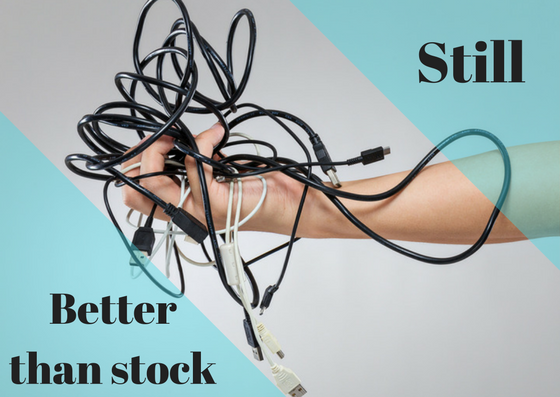I have an exercise I need everyone to participate in right now, okay?
First, I need you to consolidate every stock image you have in your library into one external hard drive. Lock them up safely in that little box where they can’t get out. Now I need you to drive up a very tall mountain, and (safely) walk to the nearest cliff. With all of your strength, huck that hard drive as far as you can and in a direction where nobody will find it. They can’t hurt anyone anymore.
I’m gonna go all office space on my printer! #OnMyLastDayAtWork pic.twitter.com/MU00HrPXB4
— Melody Beals (@MelodyUnplugged) May 13, 2017
Alright that might be a little extreme, but stick with me, because there’s there is a point to this madness.
Our primate brains are prewired to respond to visuals 60,000 times faster than text. It makes sense if you think about it. We evolved to identify threats and opportunities, and the fastest way to do that was to use our eyes. Bear = danger, berries = yum.
Just because we have been working in offices for the past sixty to seventy years doesn’t mean we get to throw away fifty million years of prewired survival mechanisms. If anything, with our shortened attention spans of 8.25 seconds (less than a goldfish), we are more prone to visual distractions than our ancestors.
Frideeey yea pic.twitter.com/k7XbMaGkOO
— Henry The Dog ?✌️? (@HenryTheDoggo) June 2, 2017
Distracted by the puppy? It’s okay, you never had a choice.
So how does this relate to content marketing?
Well, were you paying attention, or are you still watching the dog eating a ballpark frank? Creating content that is text-only is fighting against our biological predisposition. So why fight? Let me debunk a few objections you may have to creating engaging imagery in your content.
1. It’s too expensive
No it isn’t. If you can’t pony up the dough to create custom imagery, no problem. You can embed social content from Instagram, Twitter, and Quora. Watch, I will do all three below.
SAINT, mini blue and tan boy. Price 6500 euro ($7300 usd) https://t.co/d1pNlhuSsY pic.twitter.com/2n6XnzuMek
— French Bulldog (@frenchbullpuppy) May 31, 2017
See how easy that was?
2. I’m in tech, I can’t publish images of French bulldogs.
Fair point. You may be in an industry that doesn’t lend itself well to French Bulldogs (that’s unfortunate, but we get it), but that doesn’t let you off the hook. As a matter of fact, due to the abstract nature of your products and services, there is even more pressure to create engaging imagery. And don’t even think about using something like this:

The second your audience sees this image, they tune out. You would be better off having nothing at all. The market is saturated with uninspired imagery. If it doesn’t add value, it doesn’t belong on your blog. Get yourself a Canva account and turn your stock image into something mildly palatable.

That horrible picture above? I made it in two minutes, and it still is more interesting than a stock photo.
3. We have strict blog guidelines.
If they are that strict, then don’t have a blog. Seriously, with the amount of noise out there, you need to have an opinion, you need to have a voice, you need to be unafraid. Without a dash of personality your blogs are going to sit around gathering dust, save for the errant spam bot that happens upon it, (and even the spam bot will be bored).
The point is, if your blog is too stuffy for engaging imagery, you need to tear down your brand guidelines and start fresh. But make sure to start with the user’s experience first this time. Slash the red tape, break things, and watch traffic start rolling in.
Results are real
When you start going with the tide of visual content marketing, you’re going to reap its benefits. It’s what the market is asking for. Some facts to chew on:
- Our client drove 492% more traffic to blogs with custom images than those without.
- Readers spend more time looking at images than text.
- Tweets with images receive 150% more Retweets than those without.
- Articles with an image used once every 75-100 words receive double the social shares than those that don’t.
Conclusion
What we really need to understand is that the market hasn’t really “shifted” towards visual marketing in any sense. We have always been visually inclined creatures.
 The only thing that truly changed during our evolution was that we started sitting down at desks and broke a natural cycle of learning and behaving through visual stimulus. As a successful marketer, you are going to need to got on the bandwagon before you become obsolete.
The only thing that truly changed during our evolution was that we started sitting down at desks and broke a natural cycle of learning and behaving through visual stimulus. As a successful marketer, you are going to need to got on the bandwagon before you become obsolete.
Check out our most recent ebook on visual content marketing to get the full scoop.





